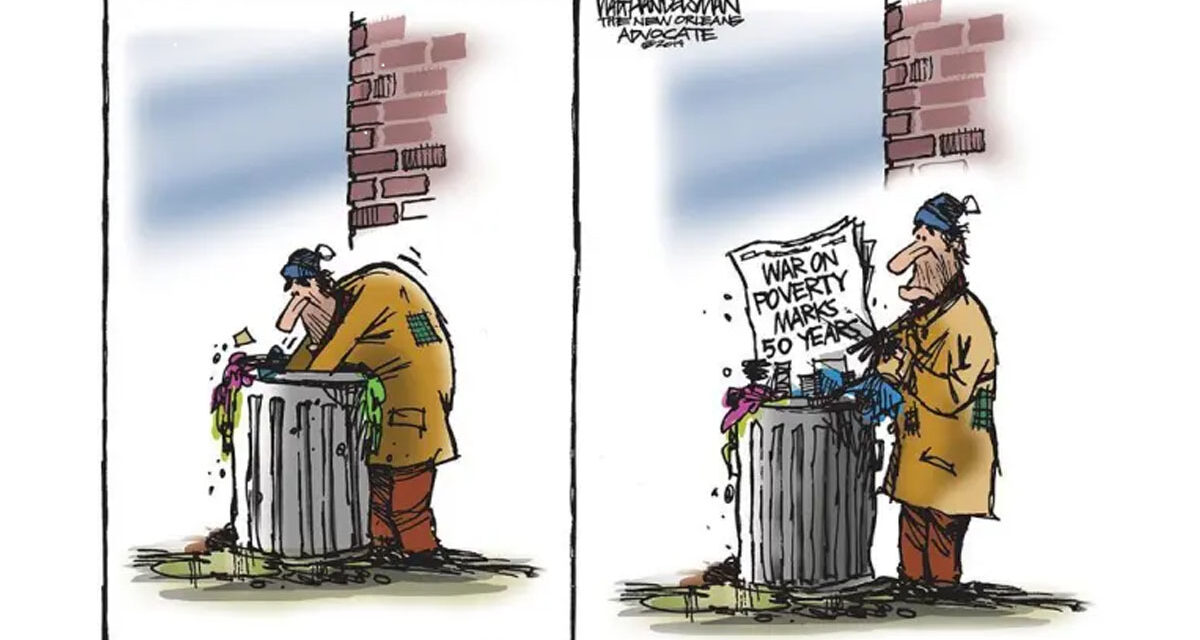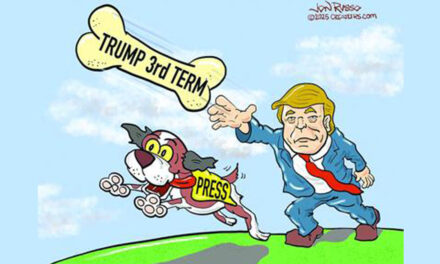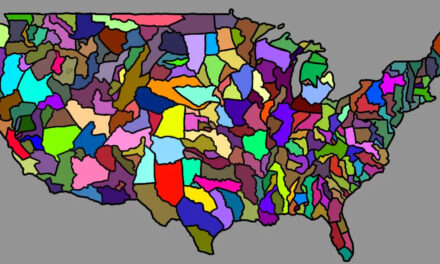
Black History Month (Part 10): The flip side of President Johnson

In Part 9, I discussed the positive role that President Johnson played in the passage of the civil rights legislation in the mid-1900s. But there was another side of the Johnson presidency that worked against Black Americans. His “Great Society” and “War on Poverty” programs were sold as benefits to the minorities trapped in the poverty of generational welfare dependency. Things were not as they seemed, however, as I explain in my book, “Who Put Black in That PLACE? The Long Sad History of the Democratic Party’s Oppression of Black Americans … to This Day”
While the War on Poverty was promoted as beneficial to Black Americans, it was a very expensive failure – for Blacks and the American taxpayer. That is because the War on Poverty was never intended to uplift Blacks living oppressed and impoverished in the great urban ghettoes. Rather, it was intended to hold them more firmly in the grip of generational welfare dependency. Johnson admitted as much.

“… Johnson recognized the need to keep Black voters in the Democrat party. This partisan pragmaticism was later seen in his Great Society and War on Poverty programs, which he is reported to have told a group of southern senators that his welfare legislation would ‘keep the niggers voting Democrat for 200 years.’”
The language was consistent with Johnson’s regular us of the n-word. As noted in a previous Black History Month commentary, Johnson was dubbed “the Connoisseur of the n-word”. From the book:
“Recognizing the advantage of being the party of minority dependency, Johnson moved to expand the so-called entitlement programs as the War on Poverty component of his signature Great Society theme. His motivation was arguably more political than humanitarian. That is borne out by the results over the years. The more than a trillion dollars spent on behalf of segregated and impoverished Blacks have kept them voting Democrat, but in terms of ending segregations and impoverishment, the War on Poverty funds resulted in no discernible benefit.
Like all the civil rights legislation in the past, the 1960s acts did not end the Democratic Party’s pernicious devotion to institutional de facto racism and segregation in the major cities. The South would not dramatically change on racial policies until Republican governors and legislatures made inroads in Dixie in the 1970s and 1980s.”
The War on Poverty and other Great Society programs were successful in their primary mission — keeping millions of mostly segregated Blacks trapped in generation welfare dependency. It is the reality to this day.
In terms of lifting Blacks out of poverty and breaking up the urban segregation, the Johnson programs were utter failures.
“War on Poverty Fails Blacks
In the sixty years following Johnson’s War on Poverty legislation, the federal government has spent more than 22 trillion dollars on programs allegedly to fight poverty and joblessness. The only thing accomplished by those expenditures was to keep Blacks in their PLACE and voting overwhelmingly for Democrat candidates. In terms of its social and economic goals, the War on Poverty has been an enormous failure. Throughout the years since Johnson declared his War on Poverty the plight of Black America continued to suffer poverty, violence, high unemployment, second-class citizenship, and inferior education.
The War on Poverty imposed an additional hardship on ghetto-ized Blacks: the breakdown of the family. Government policies encouraged single mother households and thus fatherless families. Over the years, crime and incarceration soared to unprecedented levels. In no small irony, the only upward statistics among inner city Blacks has been the percentage voting for the Democratic Party and the number of Blacks being murdered on the streets of Democrat-controlled cities.
The War on Poverty has been an abysmal social and economic failure. In the preface to the article ‘The War on Poverty after 50 Years,’ policy analysts Robert Rector and Rachel Sheffield wrote:
In his January 1964 State of the Union address, President Lyndon Johnson proclaimed, ‘This administration today, here and now, declares unconditional war on poverty in America’. In the 50 years since that time, U.S. taxpayers have spent over $22 trillion on anti-poverty programs. Adjusted for inflation, this spending (which does not include Social Security or Medicare) is three times the cost of all U.S. military wars since the American Revolution. Yet progress against poverty, as measured by the U.S. Census Bureau, has been minimal, and in terms of President Johnson’s main goal of reducing the ‘causes’ rather than the mere ‘consequences’ of poverty, the War on Poverty has failed completely. In fact, a significant portion of the population is now less capable of self-sufficiency than it was when the War on Poverty began.” (emphasis added)
A great percentage of the money was directed at minority urban poverty—money that was ineffective at best or callously misused at worst. Rather than provide Blacks with personal freedom, good education, upward mobility, and all the other blessings of liberty, the Democrats created a new paradigm by which they could keep the mass of Black Americans enslaved in generational dependency and apart from the American Dream so hopefully articulated by Martin Luther King.
In retrospect, the War on Poverty was arguably as damaging as southern de jure segregation to the segregated Black communities. It relegated Black Americans more firmly into that PLACE of second-class citizenship with many of the same historic deprivations as Jim Crow laws and slavery. The urban ghettoes had become known as political plantations.”
Whether you believe that the War on Poverty was a well-intentioned effort or a cynical ruse by Johnson and the Democratic Party, it is irrefutable that the War on Poverty was an abysmal colossal and expensive failure from the onset.
The question that remains is where did all that money go? That would be a subject of a future commentary, but generally, money flowed to political insiders, consultants, community organizers, universities for studies and a number of other non-government organizations (NGOs). A lot of folks got very rich, and a lot of organizations got very fat off all that money. With little to no benefit for the poor and oppressed people.
In Black History Month (Part 11), I will cover specific realities of institutional and systemic racism that exists to this day in our major cities with large segregated and oppressed Black populations.
So, there ‘tis.































Not MAGA.
Yup, Larry, you got me although you really didn't have to be such a dick about it. I just read…
Larry, Before you open your mouth again (and continue to make yourself look foolish), I suggest you educate yourself on…
The totals are for extremist events and stand as is. I am not sure of riot deaths by either side…
Frank Danger ... While I mostly ignore your obsessive idiocy, I had to respond to this bit of twisted trash.…